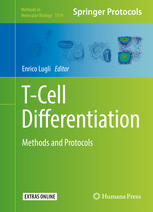

Most ebook files are in PDF format, so you can easily read them using various software such as Foxit Reader or directly on the Google Chrome browser.
Some ebook files are released by publishers in other formats such as .awz, .mobi, .epub, .fb2, etc. You may need to install specific software to read these formats on mobile/PC, such as Calibre.
Please read the tutorial at this link: https://ebookbell.com/faq
We offer FREE conversion to the popular formats you request; however, this may take some time. Therefore, right after payment, please email us, and we will try to provide the service as quickly as possible.
For some exceptional file formats or broken links (if any), please refrain from opening any disputes. Instead, email us first, and we will try to assist within a maximum of 6 hours.
EbookBell Team

5.0
20 reviewsThis volume provides protocols to successfully apply cutting-edge technologies to characterize the biology of T cells at an unprecedented level of complexity. Chapters guide readers through flow cytometry and fluorescence-activated cell sorting, the behaviour of single T cells after adoptive cell transfer (ACT), single cell gene expression by multiplex PCR, lentiviral transduction approaches, protocols to derive large numbers of early-differentiated memory T cells by using dedicated cytokines cocktails, approaches to measure telomerase activity in terminally differentiated T cells, and approaches to define Treg cells at the phenotypic and functional level. The final part of the book is dedicated to the analysis of the differentiation and effector functions of innate T cells, namely the well-known γ/δ T cells, and the recently identified CD8+ mucosal associated invariant T (MAIT) cells. Written in the highly successful Methods in Molecular Biology series format, chapters include introductions to their respective topics, lists of the necessary materials and reagents, step-by-step, readily reproducible laboratory protocols, and tips on troubleshooting and avoiding known pitfalls.
Authoritative and cutting-edge, T-Cell Differentiation: Methods and Protocols aims to provide protocols that are fundamental to monitor the T cell compartment at the level of single cells in pathological and immunotherapy conditions.